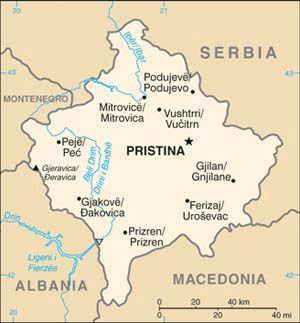Kosovo: The UN Role In The North – Analysis
Attempts by Pristina to drive the UN mission out of the north – in particular through cuts in funding and the establishment of its own “Potemkin” administration – has only served to reinforce the partition of Kosovo.
By Gerard M. Gallucci
While Pristina rejects the continued relevance of the UN mission in Kosovo (UNMIK) – with one official saying recently that its only role is to make reports – the organization remains in place subject to UN Security Council Resolution 1244. As the status of Kosovo remains unsettled – though each side has its own strong view – and tensions between Serbs and Albanians continue to exist, UNMIK remains responsible for peacekeeping according to that 1244 mandate. UNMIK is especially relevant in north Kosovo where the only local institutions are Serbian and Kosovo ones are absent and actively rejected. The UN has been unable to play a very active role in keeping the two sides apart due to the split in the Security Council over Kosovo status. But it still has an important role in preserving peace and the territorial integrity of Kosovo. In the event of renewed conflict along the Ibar River, it would again be on the front line.

Pristina’s disregard – and disrespect – for the United Nations and the mandate of its mission in Kosovo does not speak well for any aspirations for eventual UN membership. But the real problem lies more in what Pristina has sought to do on the ground – drive the UN mission out of the north. It has bullied local Kosovo Albanians living in the north – and there are many – into non-cooperation with UNMIK, even when it would be of mutual advantage. The effort to expel the UN has focused especially on North Mitrovica. The Pristina government has tried to demonize the UN staff working there, set up its own “Potemkin” administration and cut-off funding to the UNMIK Administration in north Mitrovica (UAM). The funds were included in the south Mitrovica municipal budget and funnelled through UAM for use in north Mitrovica for the benefit of local citizens – Albanian and non-Albanian. (North Mitrovica is the only significant multi-ethnic town left in Kosovo with Albanians, Turks, Bosniaks, Gorani and others living with the majority Serbs.) The funds paid for staff, services and projects. The funds were modest and the cut-off will have little impact, but UAM activities were the main functioning link between Pristina and the north.
UNMIK does not have its own funds to replace those lost. So the mission told local UAM employees last week that it could not renew their contracts after this year ends. Pristina heralded this as finally “closing” UAM. But UNMIK is not closing the office. In a statement, UNMIK said:
The salaries of UAM staff and all other allocations to UAM have ceased to be paid from the Kosovo Consolidated Budget. Staff from UAM who have been employed so far as Kosovo civil servants will no longer have a contract after 31 December. UAM is not closing down. We have International staff in UAM who will be focusing on conflict prevention, mediation, conflict resolution activities, and any other facilitation role that may be required.
The net effect of Pristina’s assault on UAM has been to enact its own form of partition. The UN remains with offices in all four northern municipalities – where the UN flag still flies over municipal buildings – to carry out its status neutral responsibilities.
But the role of the UN in Kosovo should not consist of just being there. As long as the Quint continues to pursue a policy of bullying Serbia into surrendering the north and the people of the north refuse to surrender, the potential for renewed conflict and violence remains. The issue now is customs. Pristina officials at the two northern crossings are unilaterally seeking to enforce collection of fees on the northern Kosovo Serbs. (Goods bound for the south pay customs at the terminal in south Mitrovica.) Belgrade and Pristina have not agreed yet on collecting customs fees or who they would be paid to. EULEX’s position is unclear but it has apparently allowed Pristina officials to operate as they please at the crossings and reportedly prevented a peaceful demonstration against customs by local Serbs. If the EU cannot remain status neutral over the north, then perhaps the UN needs to step in.
The options for the north remain limited: more ethnic violence and possibly cleansing, partition or some form of Ahtisaari Plan. Who is left to speak up for the alternatives that need not involve violence but the UN and maybe the UNMIK SRSG?
Gerard M. Gallucci is a retired US diplomat and UN peacekeeper. He worked as part of US efforts to resolve the conflicts in Angola, South Africa and Sudan and as Director for Inter-American Affairs at the National Security Council. He served as UN Regional Representative in Mitrovica, Kosovo from July 2005 until October 2008 and as Chief of Staff for the UN mission in East Timor from November 2008 until June 2010.
